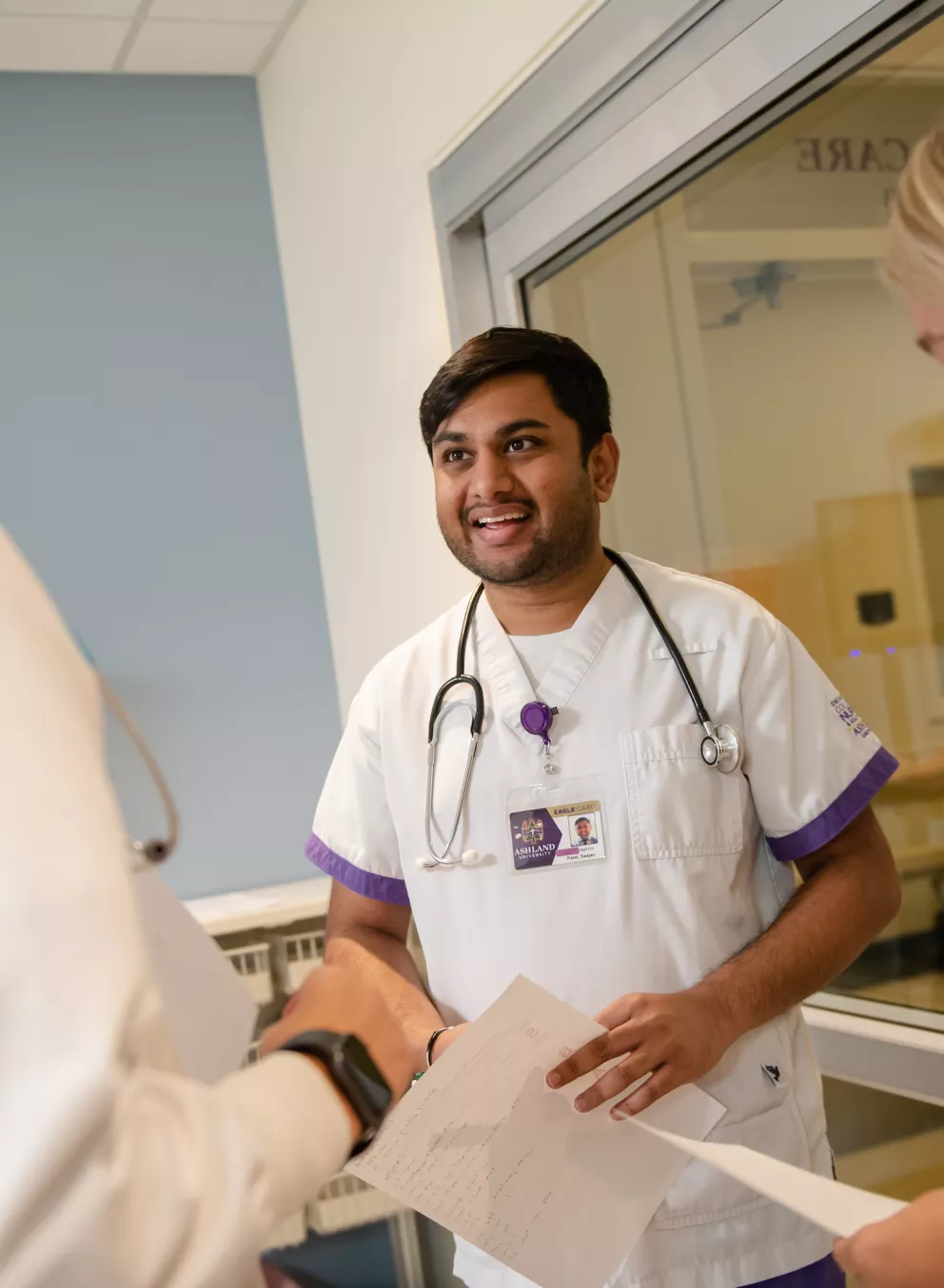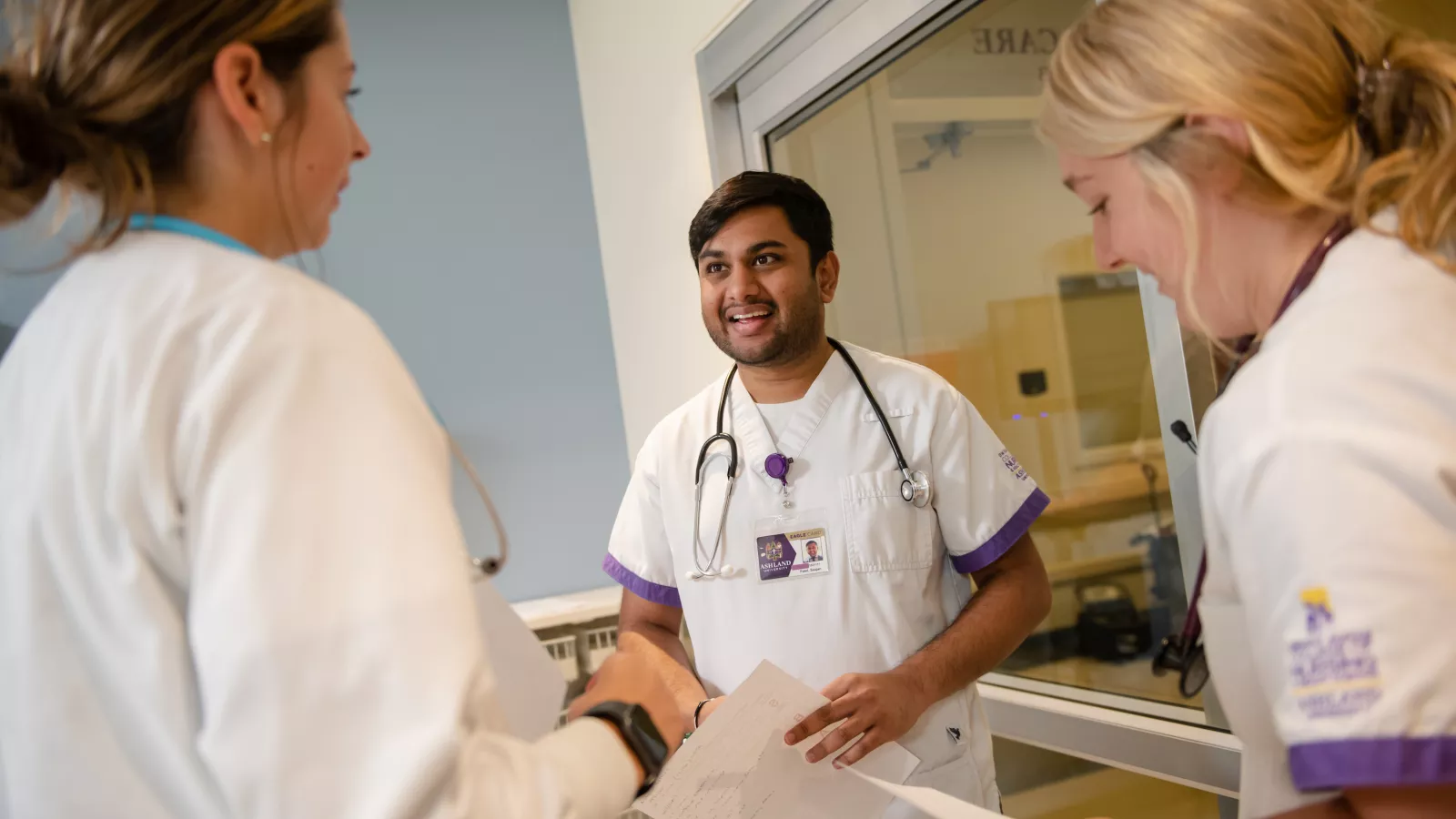Advanced Entry BSN Program Overview
Are you an ambitious high school student who is looking to get a head start on your nursing journey?
If you’ve already earned college transfer credit or participated in College Credit Plus, our Advanced Entry Nursing program gives you the opportunity to complete freshman-, sophomore- and first semester junior-level nursing coursework in a fast-paced format.
Apply early! The program starts in the fall, is very competitive and fills up quickly. Only applicants who complete the necessary application requirements on or before the application deadline will be considered for admission.

Program Benefits
- Interactive simulations at Ashland University’s state-of-the-art Simulation Center
- Clinical rotations take place within the state of Ohio.
- Direct entry program with no further application required for the clinical coursework
- 1:8 clinical instructor-to-student ratio
- Complete the BSN program in four semesters (15 months)

How Do I Know if This Program Is Right for Me?
The Advanced Entry program at Ashland University offers a tailored pathway for students with college transfer credits or College Credit Plus experience who aspire to pursue a nursing career. This program is ideal for individuals who have completed prerequisite coursework from accredited institutions, including courses such as:
- General Psychology
- Nutrition
- Microbiology with laboratory
- Organic/Inorganic/Biochemistry with laboratory
- Human Anatomy and Physiology I & II with laboratory
- Ethics
- Statistics
- English Composition I and II
If you have a strong academic background and are committed to meeting the rigorous demands of nursing education, this program provides an efficient route to entry into the nursing profession.

Learning Experiences
Upon completion of the program, you will be able to:
- Synthesize knowledge from nursing and a liberal arts education as the basis for clinical judgment, reflective practice and decision making.
- Incorporate professional standards in the practice of nursing.
- Value integrity, caring, accountability, respect and excellence in nursing practice.
- Collaborate with patients and health professionals to develop and implement culturally appropriate health promotion, disease prevention and illness care methods.
- Select current theory and evidenced-based knowledge to guide and teach individuals, families and populations about health promotion and illness prevention.
- Employ patient care technologies, information systems and communication devices that support safe nursing practice and development of nursing knowledge.
- Demonstrate knowledge of healthcare policy, finance and regulatory environments that impact patient care.
- Incorporate effective communication and collaboration skills, forming partnerships to provide care and promote positive outcomes to a diverse society in a global context.
- Apply leadership concepts, principles of advocacy and decision making in the provision of quality patient care, healthcare team coordination and accountability for care delivery in a variety of settings.
- Collaborate with healthcare professionals to enhance quality improvement and safety initiatives at individual and system levels of care.
- Investigate health-related social justice concerns within legal, ethical and political contexts.
- Value lifelong learning for personal and professional growth to support excellence in nursing practice.
Curriculum
Accelerated Nursing takes place over four consecutive semesters so you can finish in only 15 months. Learn more about the Nursing Accelerated curriculum by viewing the Curriculum Guide and Academic Catalog.
| Course # | Title | Credit Hours |
|---|---|---|
| NUR 105 | Nursing Concepts & Values | 1 |
| NUR 225 | Pathophysiology/Pharmacology I | 3 |
| NUR 226 | Pathophysiology/Pharmacology II | 3 |
| NUR 301 | Health Assessment | 3 |
| NUR 304 | Health Foundations I | 3 |
| NUR 306 | Health Foundations II | 5 |
| Total Hours | 18 |
| Course # | Title | Credit Hours |
|---|---|---|
| NUR 310 | Psychiatric/Mental Health | 4 |
| NUR 311 | Adult Health Concepts: Regulation & Transport (8 weeks) | 5 |
| NUR 312 | Adult Health Concepts: Protection, Sensation & Mobility (8 weeks) | 5 |
| NUR 336 | Genetics in Nursing and Healthcare | 3 |
| Total Hours | 17 |
| Course # | Title | Credit Hours |
|---|---|---|
| NUR 410 | Complex Health Alterations | 5 |
| NUR 438 | Maternal/Newborn Health (8 weeks) | 4 |
| NUR 440 | Pediatric Health (8 weeks) | 4 |
| NUR 460 | Theoretical Foundations in Health Research | 3 |
| Total Hours | 16 |
| Course # | Title | Credit Hours |
|---|---|---|
| NUR 420 | Community & Global Health (8 weeks) | 4 |
| NUR 425 | Trends & Issues in Global Health (8 weeks) | 3 |
| NUR 428 | Leadership & Management in Health Organizations (8 weeks) | 3 |
| NUR 430 | Advanced Simulation | 1 |
| NUR 435 | Capstone Preceptorship (8 weeks) | 2 |
| Total Hours | 13 |
| Licensure Disclosure: The Advanced Entry BSN program curriculum meets educational requirements of all 50 states for graduates to apply for a Registered Nurse license. The National Council of State Boards of Nursing (NCSBN) provides professional licensure requirements by state. Additionally, NCSBN identifies participating jurisdictions as part of the Nurse Licensure Compact. AU's Advanced Entry BSN program does NOT meet the educational requirements for licensure in the District of Columbia or the U.S. territories of American Samoa, the Commonwealth of Puerto Rico, Guam, the Virgin Islands, the Commonwealth of the Northern Mariana Islands, the Republic of the Marshall Islands, the Federated States of Micronesia, and the Republic of Palau. If a student’s permanent residence is in a U.S. territory, they can only enroll in this program if they plan to work in a state where the AU program does meet the educational requirements for licensure. The program makes every effort to provide accurate and up-to-date information; however, individual state licensure requirements may change. |
Additional BSN Tracks
Admission Requirements
Applicants must have:
- Attended an accredited college or university.
- At least a 2.9 (on a 4.0 scale) cumulative grade point average in college coursework.
- A science prerequisite coursework cumulative grade point average of 2.5 on a 4.0 scale prior to the start of the Advanced Entry program.
- Completed the following prerequisite courses from an accredited college or university with a minimum letter grade of "C" (science prerequisite coursework must have been completed within 10 years prior to the program start date).
- Developmental Psychology
- Nutrition
- Microbiology-must include a laboratory
- Organic/Inorganic/Biochemistry - must include a lab
- Human Anatomy and Physiology I & II - must include a lab
- Ethics
- Statistics (does not have to be equivalent to Ashland University’s Statistics course)
- English Composition I and II
- Successfully completed all required core courses prior to the start of the Advanced Entry program.
- Submitted an application for admission to Ashland University.
- Met all other requirements of the traditional 4-year program.
- Pass a criminal background check and drug screen prior to entering clinical coursework.
- Meet the health status criteria for mental and physical health.
- Provide documentation of ability to perform the essential functions for clinical course work.
- Complete a record of required immunizations.
Graduate Outcomes
Graduates of Ashland’s nursing programs are well-prepared for the workforce. In 2024 Ashland University's National Council Licensure Examination (NCLEX-RN® exam) pass rate was 93.15%, surpassing the Ohio average of 89.55% and the national average of 91.92%.

Can You Give Me a Glimpse of My Future?
Your BSN credential will position you for advancement into roles such as nurse manager, clinical coordinator or specialty nurse practitioner, where you can take on leadership responsibilities, contribute to evidence-based practice and positively influence healthcare outcomes. Additionally, having a BSN may lead to increased earning potential and job security, while also providing a strong foundation for pursuing further education at the graduate level if desired.
The national average for nurses who have completed their Bachelor of Science in Nursing degree is $92,607 per year. (Indeed)
Nurses can obtain careers in a variety of areas not limited to:
- Occupational Health Nurse
- Operating Room Nurse or Manager
- Organ Transplant Coordinator
- Hospice Nurse
- Clinical Nurse
- Nurse Educator
- Director of Nursing
- Critical Care Nurse
- Emergency Room Nurse
- Neonatal Nurse
- Nurse Manager
Recent Employers of AU Graduates Include:
- Nationwide Children’s Hospital
- Akron Children’s Hospital
- Cleveland Clinic
- OhioHealth
- AVITA
- University Hospitals
- The Ohio State University Wexner Medical Center
- Fisher Titus Medical Center
- Wooster Community Hospital
- Knox Community Hospital
- The Christ Hospital

